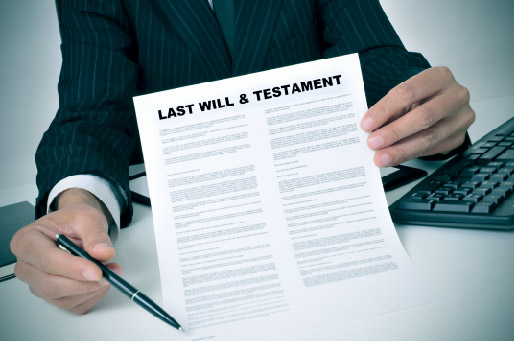Dianna M. Williams, Esq. | Associate
 Dealing with the death of a loved one is a tremendously hard, emotional experience. Everything seems to happen very quickly and, in addition to grieving and making funeral or memorial service arrangements, the thought of going through your loved one’s possessions can be overwhelming. With hopes of making this experience a little more bearable, this article will give some basic background information on the probate process in Massachusetts.
Dealing with the death of a loved one is a tremendously hard, emotional experience. Everything seems to happen very quickly and, in addition to grieving and making funeral or memorial service arrangements, the thought of going through your loved one’s possessions can be overwhelming. With hopes of making this experience a little more bearable, this article will give some basic background information on the probate process in Massachusetts.
One of the first steps you want to take in settling your loved one’s estate is to find out whether they died with a will (“testate”) or without a will (“intestate”). This will help determine how to proceed with administration. If you can’t find a will amongst the decedent’s belongings, or if you find a will but aren’t certain whether it is the most recent one, you may want to see if there is a copy at his/her attorney’s office or in a safe deposit box. Additionally, any person who has possession of the decedent’s will and learns of his/her death has thirty days after notice to deliver the will to someone with the ability to probate the estate or, if none is known, to the probate court in which the decedent resided.
Probate is a court-supervised legal process through which an individual, usually a surviving spouse or close family member, is given authority to gather the decedent’s assets, pay outstanding debts, taxes and expenses, and distribute any remaining assets according to the terms of a will or, if there is no enforceable will, according to Massachusetts intestate distribution laws. In many cases, a probate proceeding will need to be commenced, and a personal representative appointed, in order to access funds held in accounts (i.e. bank or brokerage accounts) in the sole name of the decedent, which will be needed to make payments and distributions.
Probate proceedings, however, may not be necessary for some or all of the decedent’s assets. The decedent may have assets held in trust, owned jointly with other persons (i.e. real property owned in a tenancy by the entirety with the surviving spouse) or designated to go to a certain beneficiary upon his/her death (i.e. life insurance policy), which will pass to the appropriate persons outside of probate.
Therefore, in order to determine how best to proceed with the administration of your loved one’s estate, it is also important to figure out, at least preliminarily, what assets they are leaving behind. You should look through his/her financial documentation to see what accounts and policies he/she had, which financial institution these accounts were held at, and in what capacity the accounts were held (i.e. individually, in trust, or jointly with another person). You should also determine whether the decedent owned real estate and, if so, in what capacity. Additionally, you should begin itemizing the decedent’s personal property, including vehicles, furniture, artwork, jewelry and other valuables. Later on, you may need to appraise these items and determine how they are to be distributed.
In March of 2012, Massachusetts adopted the Massachusetts Uniform Probate Code, which largely revised probate law in the Commonwealth in an effort to make the estate administration process easier. As a result, when probate of all or part of a decedent’s property is necessary, there are several different procedures available depending on the size and complexity of the estate.
The quickest and most basic type of administration is voluntary administration. Voluntary administration may be used in instances where the decedent left an estate consisting only of personal property (no real estate) having a total value not exceeding $25,000, exclusive of the value of one automobile. Non-probate property (i.e. property that passes to the appropriate persons automatically upon the decedent’s death) does not count towards this amount. If the decedent’s estate meets this requirement and no other probate proceeding is commenced within thirty days of the decedent’s death, any interested person may file a statement with the probate court for the county in which the decedent lived stating under oath that he/she will administer the estate according to the will or, if there is no will, pursuant to Massachusetts intestacy law, after payment of any funeral expenses, administrative expenses, and other debts of the estate. With the statement, and also with any petition for formal or informal probate, which are described below, the interested party will need to file a certified copy of the decedent’s death certificate (you should obtain several certified copies of the decedent’s death certificate to provide to various financial institutions and other entities during this process as well), along with the decedent’s last will, if applicable. Once this statement is filed, there is typically no further involvement by the court, and the person who filed the statement is free to administer the estate as agreed.
The most common procedure for settling an estate, however, is likely an informal probate proceeding. Informal probate is commenced first by mailing notice to heirs, devisees and other interested persons at least seven days before filing a petition for informal probate with the court. A petition for informal probate may be filed by any interested person, which includes heirs, devisees, children, spouses, creditors, beneficiaries, and any other persons having a property right in or claims against an estate asset or the decedent. Additional notice must also be published in a newspaper of general circulation in the county in which the decedent lived within thirty days of informal probate.
The petition for informal probate can also request that a personal representative be appointed to administer the estate. The personal representative is usually the person set forth in the decedent’s will or, if there is no will, a close relative or other interested person, with the surviving spouse having priority for appointment. Once appointed, which can be as soon as seven days after notice is given, the court (usually through a magistrate) will issue a document called ‘letters of authority’ or ‘letters testamentary.’ This document is proof of the personal representative’s legal authority to act on behalf of the estate, including collecting and managing estate property, and will likely be needed to collect assets held in the decedent’s bank accounts, to open a separate estate bank account to hold funds pending distribution, and to sell assets like real property and vehicles. Generally, once a personal representative is appointed, there is no longer court supervision and the personal representative is free to administer the estate, as required by law, including prepare an inventory of assets, provide notice to interested persons, pay debts, applicable taxes and other expenses, file necessary tax returns, and distribute assets according to the will or, if there is no will, applicable Massachusetts intestacy laws. If another interested party wants to contest an informal proceeding, he/she may do so by filing a petition for formal probate within one year of the allowance of the informal probate or three years from the death of the decedent, whichever is later.
For more complicated estates, including instances where not all heirs and their whereabouts are known or where not all heirs are in agreement as to the administration of the decedent’s estate, a formal probate proceeding is available. Formal proceedings are conducted by a judge and may be used to probate a will, to determine whether the decedent left a valid will, to resolve disputes among heirs, to set aside an informal probate, and to secure a decree of intestacy (that the decedent died without a valid will) and a determination of heirs in cases where no will has been offered. To commence a formal proceeding, an interested person must file a petition for formal probate with the court. The court will then issue a document called a ‘citation,’ which must be served on heirs and other interested parties at least fourteen days before the return date listed on the citation. Notice should also be published in a newspaper of general circulation in the county where the decedent resided at least seven days before the return date. It will likely take longer for a personal representative to be appointed in a formal probate proceeding due to the different notice requirements and opportunity for other interested parties to make objections.
Formal probate proceedings, like informal proceedings, are usually ‘unsupervised,’ with court involvement ending when the order concerning testacy (whether the decedent died with or without a will) and appointment of a personal representative is entered. However, ‘supervised’ formal proceedings may also be available upon the petition of an interested person, direction in a decedent’s will, or action of the court. This provides the highest level of oversight by the court, as no assets may be distributed without court approval. Supervised administration usually takes place in a single ‘in rem’ proceeding and may be appropriate in complex or highly contested estates to ensure that all necessary steps are being taken and that all concerns and disputes are resolved by a judge. In such an instance, a personal representative is still appointed; however, he/she is subject to the direction of the court.
Informal and formal probate proceedings, in most cases, must be commenced no more than three years after the decedent’s death. The probate process in Massachusetts will take at least six months, however, it is not usual for it to take longer than a year, particularly since creditors have one year from the date of the decedent’s death to file claims against the estate. The more complex and contested an estate is, the longer it will take.
The probate procedure in Massachusetts, and estate administration in general, is a complicated process involving many steps, and this blog post is by no means exhaustive. If you have any questions or would like assistance navigating through the probate process, please call the attorneys at Wynn & Wynn, P.C.











